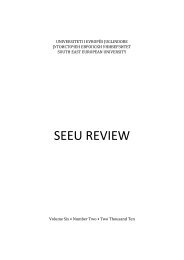SEEU Review vol. 5 Nr. 2 (pdf) - South East European University
SEEU Review vol. 5 Nr. 2 (pdf) - South East European University
SEEU Review vol. 5 Nr. 2 (pdf) - South East European University
You also want an ePaper? Increase the reach of your titles
YUMPU automatically turns print PDFs into web optimized ePapers that Google loves.
<strong>SEEU</strong> <strong>Review</strong> Volume 5, No. 2, 2009<br />
nation. That is why there has never been such thing as “Europe”, in an<br />
essentialist sense, but many imaginations of Europe (Malmborg & Strath,<br />
2002).<br />
As the idea of Europe is closely tied to the history of the nation-state in<br />
the last two hundred years, then adjectives “<strong>European</strong>” and “national” are<br />
not alternatives, but are articulated in multiple ways (ibid., p. 6). Questions<br />
such “How <strong>European</strong> is our nation?”, or “What does Europe think of us?”, or<br />
“Should we love or hate Europe?” are continually asked in national contexts,<br />
even at present, with important consequences for the future. In this paper we<br />
will be dealing with the various meanings of Europe articulated in political<br />
debates for the way of development of the Albanian nation-state in the<br />
interwar period. The research questions that we will attempt to answer here<br />
are what are the main meanings of “Europe” articulated in Albanian political<br />
discourse of the time, how do they vary according to the different subject<br />
positions and if there was a dominant understanding of “Europe” at that<br />
time?<br />
In our opinion, the Albanian case during the inter-war period is revealing<br />
for studying the meanings of Europe in nation-building processes in the<br />
periphery of the continent. Albania is one of the new nation-states in <strong>East</strong>ern<br />
Europe which came into existence, or regained their independence after the<br />
collapse of Habsburg, Ottoman and Russian empires at the end of the Great<br />
War. The interwar period is deemed essential for the national identity of<br />
these peoples, because it is a time when the national political and cultural<br />
elites in the new states of <strong>East</strong>ern Europe were looking up to the West to<br />
provide legitimacy, moral inspiration and guidance, security and assistance<br />
to their countries, at a time when, ironically, the Western civilization was in<br />
crisis and Europe was turning into what Mark Mazower (1998) has aptly<br />
called the “dark continent”. But, considering the dismemberment during and<br />
after the Second World War, or, incorporation to the communist empire, in<br />
the historical memory of these national states the interwar period has often<br />
been considered as the highest point of their aspiration to join <strong>European</strong> or<br />
Western “civilization”. After the breakdown of the communist regime in<br />
1990, many Albanian intellectuals are nostalgically considering the interwar<br />
period as the most Western one in the history of the country and there are<br />
similar feelings across the region of ex-socialist states. The predominant<br />
discourses in Albania portray communism as another rupture with the<br />
natural course of Albania toward the West in and intellectuals are seeking to<br />
“reconnect” the present with the ideas flourishing in Albanian press during<br />
1920s and 1930s, so as to provide a contemporary moral and spiritual<br />
renewal of national identity, as well as a guidance to the integration process<br />
37

















